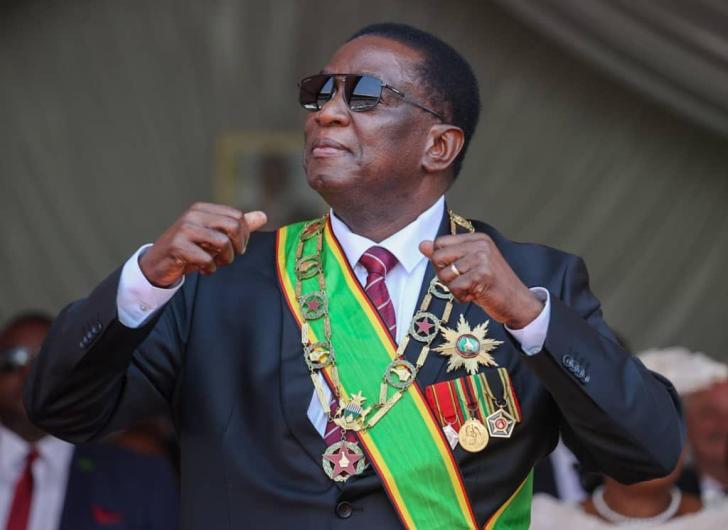News / National
Mnangagwa back home from United Nations summit
25 Sep 2023 at 07:35hrs |
942 Views

President Emmerson Mnangagwa has returned to Zimbabwe from New York, USA, where he attended the 78th Session of the United Nations General Assembly (#UNGA78). During the UN General Assembly conference, he engaged with various political and business constituencies, achieving significant success.
The UNGA debate centered around the theme of "Rebuilding trust and reigniting global solidarity: Accelerating action on the 2030 Agenda and its Sustainable Development Goals towards Peace, Prosperity, Progress, and Sustainability for All."
In his keynote address, President Mnangagwa emphasized Zimbabwe's commitment to democracy, constitutionalism, good governance, and the rule of law following the recently held 2023 harmonized general elections. He expressed satisfaction with the peaceful conduct of the elections.
The President also strongly condemned the use of unilateral and illegal sanctions as a foreign policy tool by some powerful nations. He called for the unconditional lifting of sanctions imposed on Zimbabwe, Cuba, and others, stating that such punitive actions hinder trust, global solidarity, and multilateralism.
Despite the economic challenges posed by sanctions, Zimbabwe is using its own resources to initiate critical infrastructural developments, including expanding the Robert Gabriel Mugabe International Airport, developing Lake Gwayi-Shangani, rehabilitating the Harare-Masvingo-Beitbridge highway, and constructing new clinics and schools, particularly in rural areas.
During his visit to New York, President Mnangagwa held private meetings with three fellow SADC Heads of State: President Filipe Nyusi of Mozambique, Angolan President and SADC Chairman Joao Lourenco, and Namibian President Hage Geingob. They congratulated him on his election victory and discussed matters of regional importance.
These meetings were crucial, especially considering the SADC Election Observer Mission's unusual report, which exceeded its mandate by criticizing Zimbabwe's laws and sovereignty. This dialogue between former liberation movements leading SADC countries aimed to exchange insights, particularly ahead of Eswatini's general elections.
Business delegations from General Electric, Afreximbank Bank, and Zimbabwean diaspora professionals also held productive closed-door meetings with President Mnangagwa. These discussions promised a brighter future for Zimbabweans.
Moreover, representatives of Zanu-PF Diasporans in the United States and Canada met with the President, and a group of diaspora professionals signed an agreement with the Zimbabwe Investment and Development Agency (ZIDA) to develop a multi-billion-dollar biotech city. President Mnangagwa assured them that suitable land in the Eastern Highlands, offering ideal climatic conditions, is available for the project. This investment holds significant potential for Zimbabwe and Africa, fostering innovation and growth in the biotech sector.
President Mnangagwa was accompanied by various government officials, including the Minister of Foreign Affairs and International Trade, the Minister of Finance, Economic Development, and Investment Promotion, the Minister of Skills Audit and Development, and others.
The UNGA debate centered around the theme of "Rebuilding trust and reigniting global solidarity: Accelerating action on the 2030 Agenda and its Sustainable Development Goals towards Peace, Prosperity, Progress, and Sustainability for All."
In his keynote address, President Mnangagwa emphasized Zimbabwe's commitment to democracy, constitutionalism, good governance, and the rule of law following the recently held 2023 harmonized general elections. He expressed satisfaction with the peaceful conduct of the elections.
The President also strongly condemned the use of unilateral and illegal sanctions as a foreign policy tool by some powerful nations. He called for the unconditional lifting of sanctions imposed on Zimbabwe, Cuba, and others, stating that such punitive actions hinder trust, global solidarity, and multilateralism.
Despite the economic challenges posed by sanctions, Zimbabwe is using its own resources to initiate critical infrastructural developments, including expanding the Robert Gabriel Mugabe International Airport, developing Lake Gwayi-Shangani, rehabilitating the Harare-Masvingo-Beitbridge highway, and constructing new clinics and schools, particularly in rural areas.
These meetings were crucial, especially considering the SADC Election Observer Mission's unusual report, which exceeded its mandate by criticizing Zimbabwe's laws and sovereignty. This dialogue between former liberation movements leading SADC countries aimed to exchange insights, particularly ahead of Eswatini's general elections.
Business delegations from General Electric, Afreximbank Bank, and Zimbabwean diaspora professionals also held productive closed-door meetings with President Mnangagwa. These discussions promised a brighter future for Zimbabweans.
Moreover, representatives of Zanu-PF Diasporans in the United States and Canada met with the President, and a group of diaspora professionals signed an agreement with the Zimbabwe Investment and Development Agency (ZIDA) to develop a multi-billion-dollar biotech city. President Mnangagwa assured them that suitable land in the Eastern Highlands, offering ideal climatic conditions, is available for the project. This investment holds significant potential for Zimbabwe and Africa, fostering innovation and growth in the biotech sector.
President Mnangagwa was accompanied by various government officials, including the Minister of Foreign Affairs and International Trade, the Minister of Finance, Economic Development, and Investment Promotion, the Minister of Skills Audit and Development, and others.
Source - The Chroncile
Join the discussion
Loading comments…


































